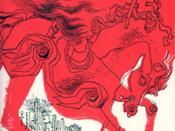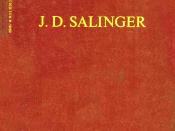The Catcher in the Rye 'The Catcher in the Rye', was written in 1951 by American author J.D. Salinger. I selected this novel for my study because I received it as a gift, and was interested in the controversy surrounding it. Indeed, it is not a "comfortable read", and it was banned in America after its first publication. However, for the purposes of this essay, I will concentrate on how successfully Salinger reveals the main character's complexities. I will examine how Salinger uses monologue, word-choice, structure, and the very behaviour of Holden Caulfield himself; to give us an insight into Holden's character. Salinger's methods are deeply thought provoking, and he even challenges our attitude to the human condition.
Superficially, the story of teenager Holden Caulfield's expulsion from yet another school, 'The Catcher in the Rye' is, in fact, a perceptive study of one seventeen year old's understanding of himself, and his world.
The character is a young man, growing up in 1950's New York, who has been expelled from school - once again - due to academic underacheivment. In an attempt to deal with his situation, he leaves school a few days before he is meant to, taking a 'break' before returning to his parent's inevitable wrath. The story is made up of Holden's elementary monologue of 'complexly simple' thoughts, and the rest uses his relay of previous dialogue (i.e.: past tense). These, and the use of digressing illustrations, clever punctuation and complex characterisation; are what make this plot so intriguing.
The novel's monologue and dialogue are both used effectively to give the feeling of casual speaking, i.e. "I mean you'd be different in someway - I can't explain what I mean" The contradictions, "you'd" and "can't" are a typical example of how Salinger establishes a conversational and simplistic tone. Also, he uses dashes for signalling digressions and pauses. This makes the dialogue come to life, giving the feeling that someone is speaking to you directly, and has not planned what to say. And instead of using commas to indicate a pause, they are usually only used where they are necessary. This re-inforces the informal tone by showing how typically Holden speaks. E.g.: "The way I met her, this Doberman pincher she had used to come over and relieve himself on our lawn, and my mother got very irritated about it." We can tell only a little about Holden from punctuation and tone. However, we can gain a deeper insight from the very words Holden uses.
We know Holden struggles - internally - with death, as he continually makes references to his dead brother Allie. Indeed, when Holden is depressed he even 'speaks' to Allie under his breath. However, if we look closely at his language, we can tell he probably has an intense fixation of death. Holden frequently uses phrases like, "That killed me" On the surface this just seems like childish banter, but if we take the word "killed" to be more significant, then we can find referrences to death throughout the novel. Of course, on its own this does not prove any real fixation on death, but there is much more evidence. This includes Holden's tendancy to notice signs of death everywhere. For example, he picked up a magazine and managed to read the two articles that led him to believe; "â¦I'd be dead in a couple of monthsâ¦" Also, Holden mentions suicide at various times in the novel. This reinforces Holden's fixation on death, but we are never sure why this is the case. It may be because he was traumatised by the loss of his brother Allie. However, it could even be that he subconsciously equates 'growing up' with the death of the child within himself. In other words, he resents and fears 'growing up' because it means the 'death' of his childhood, and increasing age reinforces his own morality. Although his fear and fascination with death are a significant factor in Holden's character, there are many more aspects to him.
We also find, through his thought provoking ideas, that Holden Caulfield has certain intrinsic preconceptions. At first glance, his constant digression and shifting thought patterns demonstrated throughout the novel, seem to be a sign of immaturity beset with an incoherent rambling. However, looking at digressions as being crucial to the character, add a whole new depth to the novel. This can be seen in Holden's statements about his sister's intelligence, followed by explanations of how well she listens, reveals Holden's own associations of intelligence with being quiet and observant. I feel that Salinger is trying - ironically - to make us challenge our own short attention spans and/or first impressions by making us look twice to realise the significance in Holden's digression. Another example is the tension Holden feels around the nuns he meets. Despite enjoying the conversation, he feared they would judge him, or ask if he was catholic. In his own words; "Catholics are always trying to find out if you're a catholic⦠â¦That⦠stuff drives me crazy." This demonstrates his discomfort with being judged morally. Also, his paranoia that people (of certain moral beliefs) look down on him for not sharing their beliefs. I find Salinger's style in revealing Holden's associations is very effective here.
Another notable feature of Salinger's writing is how he achieves a unique point of view. Instead of using the popular style of well-refined thoughts and over-elaborate descriptions, he describes things, as they are perceived upon first impression. The normal human mind does not initially process first experiences into drawn out metaphors. We must first think about them and then relate them to our previous knowledge. Holden has difficulty explaining things, and this gives an added realism to his personna. For instance, when he is describing his sister; "She's only ten. She's quite skinny, like me, but nice skinny. Roller-skate skinny." Firstly, he observes his sister. Then, he compares her image to more familiar images. Finally, he concludes by coining a phrase in order to 'classify' his sister. Salinger has expressed Holden's thought process in the same inherently analytical way that all people think. Through this, a strong tone of realism and lively thought has been achieved. Often this method is effective because a more logical and rational character is created. This is a more natural style of analysation that I can relate to more easily.
In fact, Holden Caulfield has a tendancy to analyse his world. He has the ability to reason and rationalise things around him. As proof, almost all of the insights Holden makes are of things that would not have been taught to him. He often displays understanding of people's nature, flaws and all. However, he is very cynical and often shows himself to be arrogant. In his thoughts, such as the graffiti in the school and the inquiry about 'ducks', we can see he is still quite immature. However, none of these points show why he has a mental breakdown in the end.
There are clues to what drives Holden towards insanity, embedded in his personality traits. He has fantastic mood swings, and shows little patience with some people who criticise him. A typical example of this irrational behaviour occurs when he asks Sally- his ex girlfriend - to runaway with him. She points out the flaws in his plan, and then he becomes unusually vocal and aggressive; shouting "You give me a royal pain in the ass!" This shows he may have a serious emotional problem. Also, there are other signs of mental imbalance. He rarely sleeps, and by his own admission he is a "Spendthrift". He pays for peoples drinks, donates to the nuns, and offered most people he met a drink 'on him.' Indeed, he boasts about his abundance of money when he left school, but he later needs to borrow money from his sister. He is also paranoid about silly things like obscene words being everywhere (even though he uses such words frequently), and always getting a; "Pukey cab" He has a fixation with death, and he often has bouts of depression. At one point he was very depressed and stated; "What I really felt like, was killing myself." From these behavioural issues, we can clearly see how troubled Holden truly is. It was perhaps inevitable that he would have a breakdown, but perhaps unnecessary. What I mean is that people could have intervened before it was too late. We can also see how Holden struggles internally in his dream. He dreams that there are children playing in a field, and are in danger of falling off of a cliff. In this dream, Holden catches the children and saves them. From his dream: "I have to⦠catch them" "I'm on the edge of some crazy cliff" "I'd just be the catcher in the rye and all" It is apparent that Holden is on the edge of sanity, and that he was trying to save himself, but he needed help. However, his parents and teachers failed to recognise this. Holden was left feeling 'lost' and even suicidal, with only the love of his sister to keep him from running away. The novel is as much about Holden's pain, as it is about how society does not address the issues of discontentment, emotional difficulties, or feelings of emptiness. This novel had a profound emotional effect on me, and has touched many people. I think, therefore, that Salinger was successful in creating a thought provoking story and a colourful character. I feel his methods and techniques in unveiling the complexities of Holden's character were very clever and effective.



![A.B. Salinger [i.e. Alois Benjamin Saliger] (LOC)](https://s.writework.com/uploads/0/5653/b-salinger-e-alois-benjamin-saliger-loc-thumb.jpg)

![A.B. Salinger [i.e. Alois Benjamin Saliger] (LOC)](https://s.writework.com/uploads/11/115607/b-salinger-e-alois-benjamin-saliger-loc-thumb.jpg)